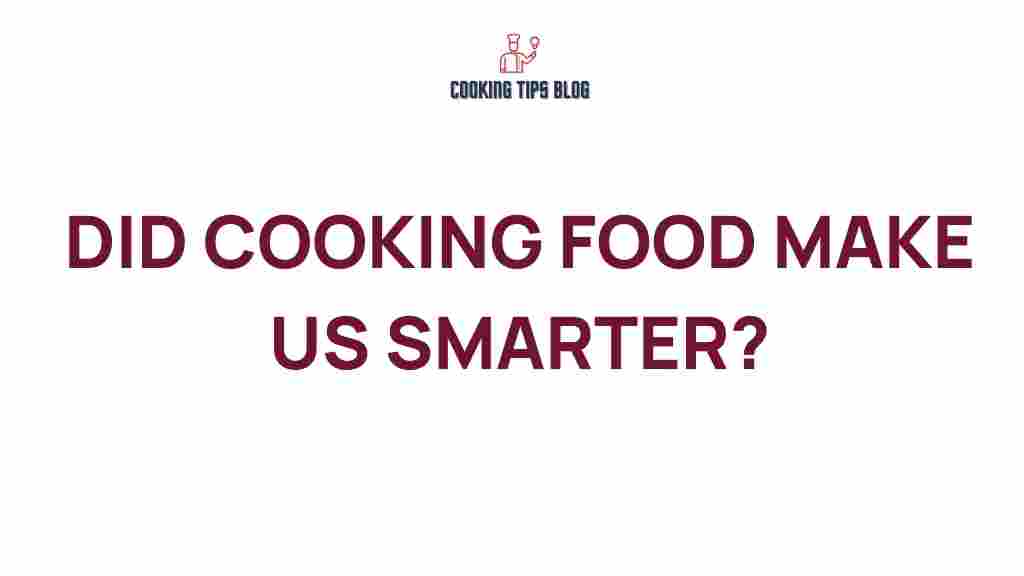Did Cooking Food Make Us Smarter? The Culinary Connection with Cooking
Throughout history, the act of cooking has been a fundamental aspect of human evolution. From the earliest days of our ancestors using fire to prepare food, to the sophisticated culinary techniques we see today, cooking has significantly impacted not only our health but also our cognitive development. This article delves into the intriguing question: did cooking food make us smarter? We will explore the connection between cooking and intelligence, examining the evolution of human diets, the cognitive benefits of cooking, and the role of social interactions in culinary practices.
The Evolution of Cooking
Cooking has been a transformative process in human history. The transition from raw to cooked food is believed to have played a crucial role in our evolutionary journey. Here are some key points about the evolution of cooking:
- Early Use of Fire: The control of fire allowed our ancestors to cook food, making it easier to digest and safer to eat.
- Nutritional Benefits: Cooking increases the availability of nutrients. For example, cooking vegetables can enhance the absorption of certain vitamins and minerals.
- Energy Efficiency: Cooked food provides more energy than raw food, which likely contributed to the development of larger brains.
- Social Development: Cooking fostered social interactions, creating communal eating practices that strengthened social bonds.
As we look back at our ancestors, we can see that cooking was not merely about sustenance; it was a catalyst for social and cognitive development.
The Cognitive Benefits of Cooking
Research suggests that cooking may have played a significant role in enhancing our cognitive abilities. Here are some ways cooking contributes to our intelligence:
- Enhancing Problem Solving: The process of cooking involves following recipes, measuring ingredients, and adjusting cooking times, all of which require critical thinking and problem-solving skills.
- Improving Memory: Remembering recipes and cooking techniques can boost memory retention and recall abilities.
- Fostering Creativity: Cooking allows for creativity and experimentation, which can stimulate brain activity and enhance cognitive flexibility.
- Encouraging Collaboration: Cooking with others promotes teamwork and communication skills, both of which are essential for cognitive development.
These cognitive benefits illustrate how the simple act of cooking can contribute to our intellectual growth.
The Role of Social Interactions in Cooking
Cooking is often a communal activity that brings people together. The social aspects of cooking can also influence our cognitive development:
- Shared Experiences: Cooking together creates shared experiences that enhance interpersonal relationships and communication skills.
- Learning Opportunities: Cooking with family and friends allows for the exchange of knowledge and techniques, promoting learning.
- Emotional Connections: Food often carries emotional significance, and sharing meals can strengthen social bonds, which are crucial for cognitive health.
These social interactions demonstrate that cooking is not just about preparing food; it’s about creating connections that contribute to our overall intelligence.
Step-by-Step Process: How Cooking Can Enhance Your Cognitive Skills
If you’re looking to leverage the cognitive benefits of cooking, here’s a step-by-step process:
- Choose a Recipe: Start with a recipe that interests you. It should be challenging enough to engage your problem-solving skills.
- Gather Ingredients: Make a list of ingredients and gather everything you need. This practice helps improve your planning and organizational skills.
- Follow Instructions: Carefully follow the recipe instructions. Pay attention to details like cooking times and temperatures.
- Experiment: Once you’re comfortable, start experimenting with variations. This boosts creativity and critical thinking.
- Cook with Others: Invite friends or family to join you. This facilitates social interaction and collaborative learning.
By following these steps, you can enhance your cognitive skills while enjoying the process of cooking.
Troubleshooting Common Cooking Challenges
Even experienced cooks encounter challenges. Here are some common issues and tips to troubleshoot them:
- Burnt Food: If you find your food burning, check the temperature settings and adjust accordingly. Lowering the heat can help.
- Undercooked Ingredients: If your dish is undercooked, increase the cooking time and check the doneness periodically.
- Flavors are Off: If the dish lacks flavor, consider adding spices or adjusting seasoning. Tasting as you cook can help you adjust flavors.
- Texture Issues: If the texture is not what you expected, reassess your cooking method. Steaming or sautéing can yield different results.
These troubleshooting tips can help you overcome cooking challenges and enhance your culinary experience.
Conclusion: The Lasting Impact of Cooking on Our Intelligence
As we’ve explored, cooking is more than just a way to prepare meals; it is intricately linked to our cognitive development. The process of cooking engages our minds, enhances our problem-solving skills, fosters creativity, and promotes social interactions. This culinary connection has likely played a pivotal role in making us smarter over time.
By embracing the art of cooking, we not only nourish our bodies but also our brains. So, whether you’re an experienced chef or a novice in the kitchen, remember that every time you cook, you are contributing to your cognitive health.
For more information on the benefits of cooking and healthy recipes, check out this resource. If you’re interested in learning about the science behind food and intelligence, visit this link.
Start cooking today, and you may find that the benefits extend far beyond just delicious meals!
This article is in the category Diets and created by Cookingtipsblog Team
